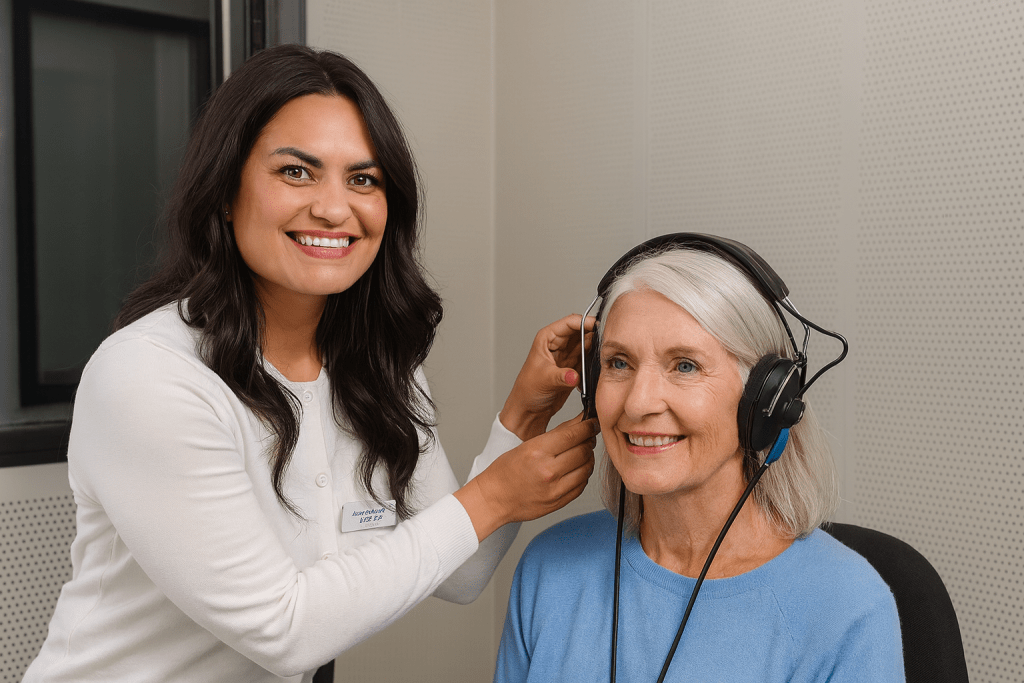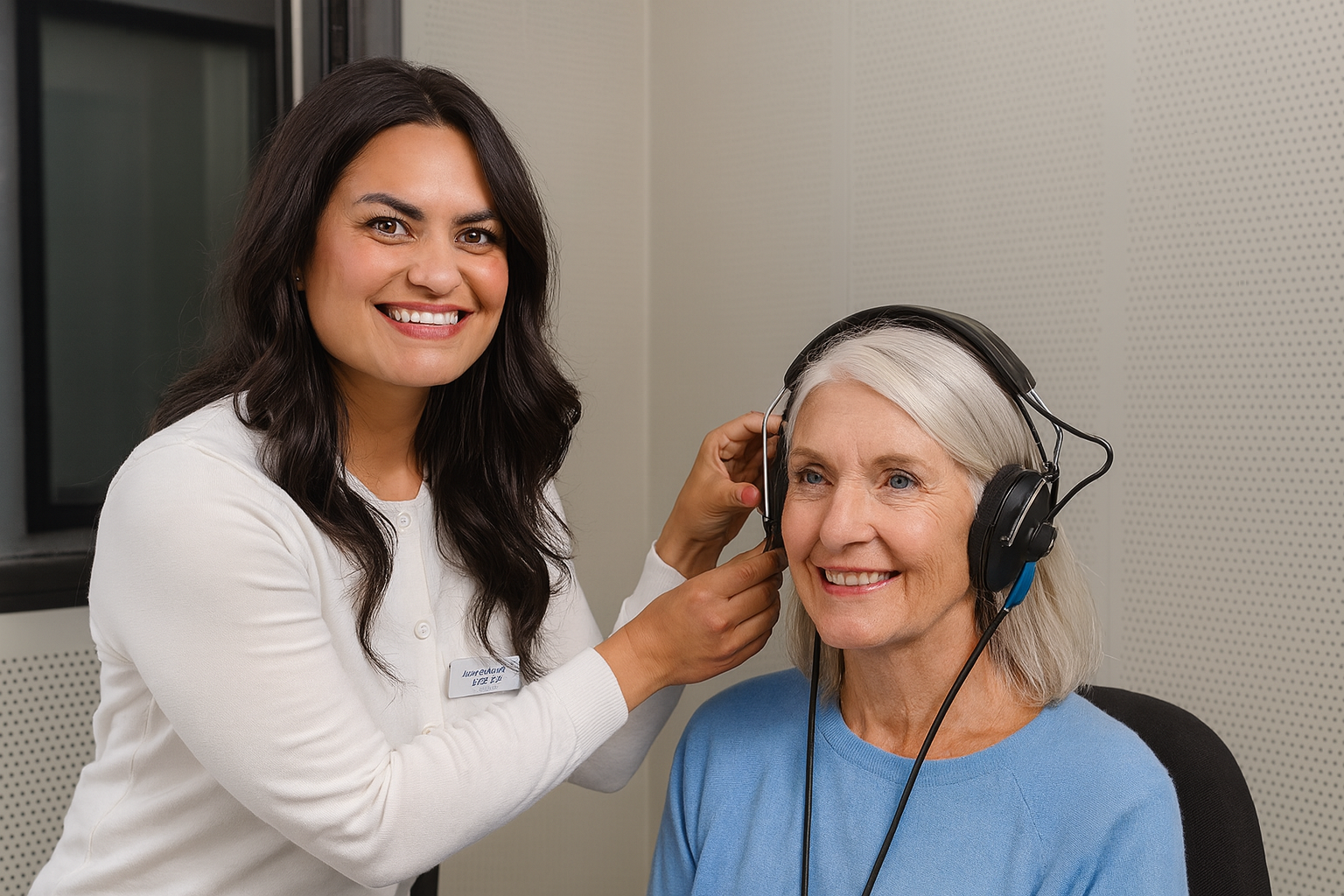Most people think hearing loss is just “getting older.” But while it’s common, it’s not normal.
Hearing loss is a progressive condition that affects far more than your ears. Research now shows it’s connected to several serious health concerns.
At Timpanogos Hearing & Tinnitus, we’ve helped thousands of people in Utah County—from American Fork to Spanish Fork—address hearing loss early and protect their overall health.
Table of Contents
- Cognitive Decline and Dementia
- Depression and Anxiety
- Parkinson’s Disease
- Cardiovascular Disease
- Diabetes
- Falls and Balance Disorders
Cognitive Decline and Dementia
Untreated hearing loss increases the risk of dementia four to five times compared to people with normal hearing (Johns Hopkins study).
This may be due to:
- Cognitive overload (your brain working harder to fill in missing words)
- Social isolation
- Brain shrinkage related to hearing loss
Treating hearing loss early helps keep the brain engaged and active.
Depression and Anxiety
Hearing loss often leads to withdrawal from social situations. This isolation can increase the risk of depression and anxiety.
A study in Laryngoscope found that people with untreated hearing loss were more likely to report moderate to severe depression.
If you’ve noticed yourself avoiding gatherings because conversations feel exhausting, it may be time for a hearing check.
Parkinson’s Disease
A 2024 JAMA Neurology study showed a link between hearing impairment and a higher risk of Parkinson’s disease.
Interestingly, the research also suggested that treating hearing loss may help preserve both cognitive and motor function.
Cardiovascular Disease
Your inner ear is sensitive to blood flow. Poor circulation, often linked to heart disease, can damage the cochlea and cause hearing problems.
The American Heart Association notes that cardiovascular health and hearing health are closely related.
Diabetes
People with diabetes are about twice as likely to have hearing loss. Just as diabetes can damage nerves in the hands and feet, it can also affect the auditory nerve in the ear.
If you’re managing diabetes, regular hearing checks are an important part of protecting your overall health.
Falls and Balance Disorders
A JAMA study found that every 10 decibels of hearing loss raises the risk of falling by 1.4 times. Balance relies on multiple senses working together—including hearing.
That’s why untreated hearing loss can significantly increase fall risk, especially for older adults.

What You Can Do
The good news is that hearing loss can be treated.
Modern hearing aids and tinnitus treatments are effective and comfortable. Early care helps protect your brain, your mood, and your long-term health.
➡️ Request your free consultation today to find out where your hearing stands.
You can also explore our Learning Center for more resources, or download one of our free books & reports.
FAQ
Does hearing loss really increase dementia risk?
Yes. Studies show untreated hearing loss can raise dementia risk by four to five times compared to normal hearing.
Can treating hearing loss reduce depression?
Yes. Many patients report feeling less isolated and more confident in social settings after addressing their hearing loss.
Should people with diabetes get regular hearing checks?
Absolutely. Diabetes can damage the auditory nerve, so hearing should be monitored just like vision and circulation.
How does hearing loss affect balance?
Hearing contributes to spatial awareness. When hearing is reduced, the risk of falls increases.
Is hearing loss preventable?
Not always, but protecting your ears from loud noise and addressing health conditions like diabetes and heart disease can help.
Many people believe that hearing loss is simply a part of the aging process that happens as you get older. We often tell people that while hearing loss is common (think like 30% of those over 65 and 55% for those over 75), it is NOT normal. Hearing loss is a progressive, degenerative disorder with far-reaching health consequences that need to be addressed as early as possible. Here are 6 of the most dramatic consequences of untreated hearing loss:
1. Cognitive Decline and Dementia
It has been well documented in the last 10 years that the inability to hear acutely exacerbates cognitive impairment and dementia. Johns Hopkins University conducted a study that showed that participants with untreated hearing impairment were at higher risk of developing dementia– four to five times higher, as a matter of fact– than that of the participants with normal hearing. Some potential causes of this association are cognitive overload, social isolation, and brain shrinkage shown to occur with hearing loss.
2. Depression and Anxiety
Another condition linked to hearing loss is depression and mental anxiety. According to a study conducted in 2025 and published in Laryngoscope, people with hearing loss are more likely to have moderate to severe depression, possibly because of the emotional strain of asking people to repeat themselves constantly. There is also an element of social isolation that happens when people start avoiding gatherings with family and friends because of the struggle to hear and participate in conversations.
3. Parkinson’s Disease and Hearing Loss
Research released in October 2024 shows a correlation between hearing impairment and Parkinson’s disease which is a neurodegenerative disease. The study which was published in JAMA Neurology, established that people with hearing impairment have a higher risk of developing Parkinson’s disease than those with normal hearing. Interestingly, this study also showed that early treatment of hearing loss could enhance brain function and may help to preserve cognitive and motor function.
4. Cardiovascular Disease
Surprisingly, hearing loss and cardiovascular health are also linked. The inner ear relies on healthy blood flow, and poor circulation caused by cardiovascular disease can damage the delicate structures in the cochlea. Research has suggested that individuals with heart disease are more likely to have hearing loss, indicating that those diagnosed with heart disease should also monitor their hearing.
5. Diabetes
According to recent studies, people with diabetes are twice as likely to be affected by hearing loss when compared to those without diabetes. Diabetes is a condition that affects the blood vessels and the nerves in the entire body including the auditory nerve in the ear. Similar to how diabetes causes neuropathy in the limbs, it can cause nerve damage in the hearing system as well.
6. Falls and Balance Disorders
According to a recent JAMA study, every 10 dB of hearing loss increases your chances of falling 1.4 fold. This rises steadilywith every stage of hearing loss, which only serves to stress the need to diagnose and treat it as early as possible.
Why Early Intervention Matters
The connections between hearing loss and these comorbidities make early intervention critical. Addressing hearing loss through hearing aids, cochlear implants, or assistive devices not only improves hearing but can also reduce the risk of associated health issues.
Protect Your Health by Protecting Your Hearing
Hearing is not just about sound—it’s about staying connected to life, loved ones, and your health. The relationship between hearing loss and these comorbidities emphasizes the importance of early treatment. By using hearing aids, cochlear implants or any other assistive devices, not only is the hearing improved but the chances of other related illnesses are also minimized. If you or someone you know is struggling with hearing loss, don’t wait. Take action today to protect your hearing and your future health.
Schedule a hearing assessment today and take the first step toward better hearing and a healthier life.

